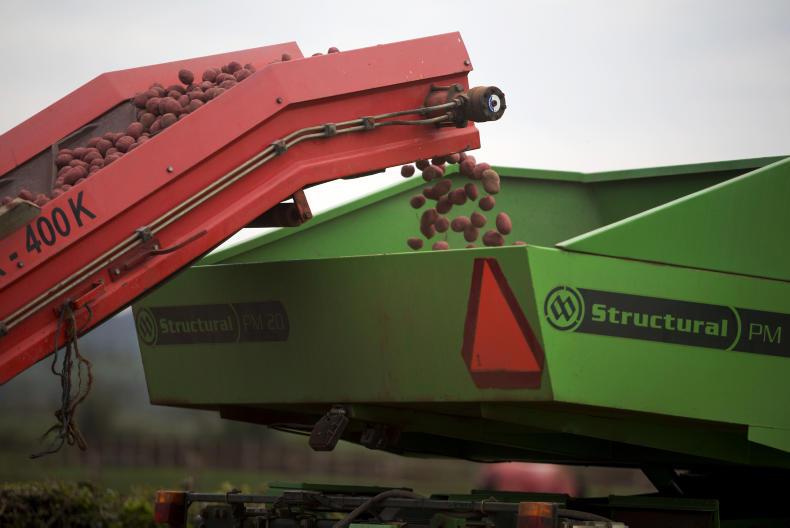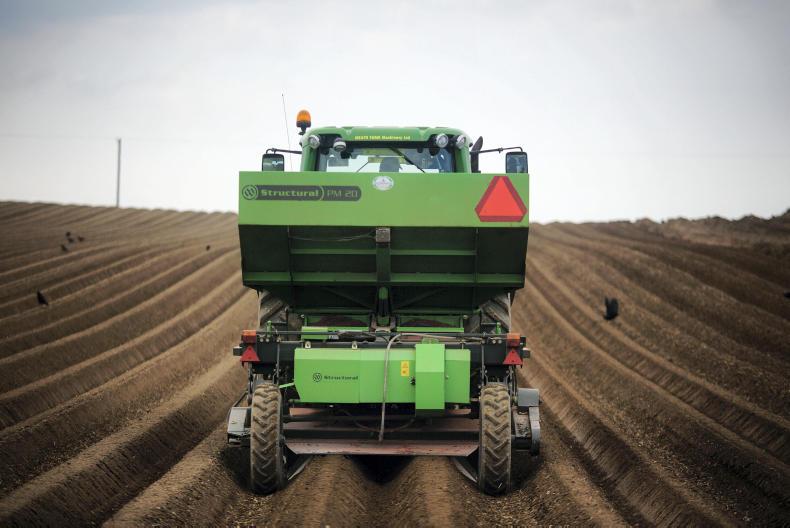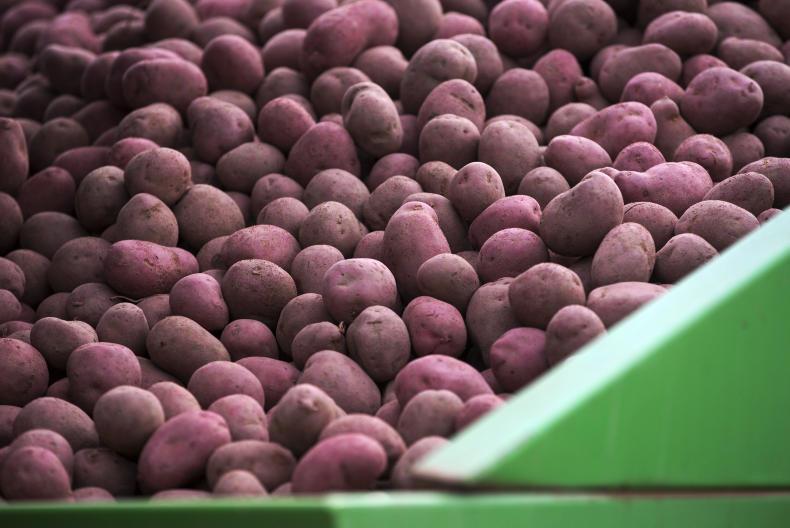Ireland was once a stronghold for potato seed production for both domestic use and export. The country was well known for having a high plant health status, meaning that many of the pests and pathogens which were present elsewhere in Europe were absent here.
However, since 1997, potato seed production in the Republic of Ireland (ROI) has reduced by an estimated 87%, equating to 33,000t.
Even by 1997, the area of potato seed grown in the country had already reduced by thousands of hectares.

Pictured are Barry Delaney, Dept of Agriculture; John Spinks, head of crops and renewables at Teagasc; Lorcan Bourke, potato sector manager Bord Bia; and IFA president Tim Cullinan. \ Finbarr O'Rourke
There are a number of reasons for this, including a reduction in ware potato crop production, changes in regulatory requirements and cost, growing disease pressure, an increase in UK and European operations of Irish seed companies, and the specialisation of potato production.
However, there may be opportunities to resurrect this industry, according to the Department of Agriculture’s Barry Delaney, who spoke at last week’s national potato conference.
What’s more is in the event of a no-deal Brexit (which is still possible), Ireland’s potato farmers may have little choice but to consider growing seed once again.
Area of potato seed
Looking back at certified potato seed production since 1997, things have changed significantly. In 1997, around 423 growers produced over 37,000t across 2,078ha (Table 1). This area increased to 2,220ha and 2,140ha in 1998 and 1999 respectively and good yields helped increase the total tonnage of seed certified those years.
However, from there the area under seed continued to fall steadily, with the exception of just a number years which saw slight increases.
The Department of Agriculture records put the total tonnage of seed produced in 2018 at just 4,086t from 29 growers across 227ha.
However, during that same period, the total area under potatoes (ware, salad, crisping and chipping) in Ireland also fell by around 54% (10,000ha).
Potato seed imports
Since 2009, nearly 50,000t of certified potato seed has been imported into ROI. Imports of certified potato seed in excess of 2kg must be notified to the Department of Agriculture so good records of imports exist dating back to 2009 (Figure 1).
On average, imports have been increasing. Years such as 2012, which saw just 2,000t imported, and 2013, which saw around 7,300t imported, do tend to disrupt trend lines, however.
When looking at the country of origin, we see that Scotland is by far our largest source of imports. Each year we import on average 3,100t of seed from the country.
This is followed by Northern Ireland, where an average of 900t are imported each year. A small amount of this potato seed is grown in Northern Ireland by ROI growers and imported across the border.

Since 1997, potato seed production in southern Ireland has reduced by an estimated 87% equating to 33,000t.
England represents our third-largest country of origin with 650t imported each year. Other countries whose imports have been growing in recent years include Germany and the Netherlands.
Over the past couple of years, we have been highlighting the potential consequences of a hard Brexit on potato seed supply to ROI. Around 95% of our potato seed imports come from the UK. As of 31 January, the UK has legally left the EU on the basis of the withdrawal agreement.
Agreement
Barry explained that during the 11-month period of the withdrawal agreement, things will stay same and UK certified seed is free to move across Europe as they will still follow EU rules and regulations.
Seed certification is an EU-wide quality assurance system whereby seed potatoes are subject to official control and inspection to ensure minimum standards throughout the EU and thereby allows free movement of this seed between member states.
If no trade deal has been agreed by the end of the year and in the absence of an extension to the withdrawal agreement then the UK becomes a third country.
This means that all UK certified potato seed imports will stop while ware imports will be subject to a 9% tariff and must be accompanied by thorough phytosanitary documentation.

Potato seed production could make a return to Ireland.
While the Northern Ireland Protocol may allow seed to be imported across the border, that will still leave the country significantly short on seed.
Some effort is being made to turn the tide on Ireland’s seed production industry.
Late last year, we spoke to Craig Stephen, commercial sales director at Solana Seeds UK and Ireland, who had organised an information day in Greenmount, Co Antrim, for potato growers interested in growing seed.
Solana Seeds is part of the German-based potato breeding and seed supply company Solana Group, which supplies crisping varieties to the Irish market.
Contract
Craig explained that he was keen to find growers to supply 500t of potato seed under a fixed-price contract.
Craig was optimistic about the future of seed production in Ireland. Listen to the full podcast with Craig online. While this is small in terms of the area of seed potatoes lost throughout the years, it is a step in the right direction.
Ireland was once a stronghold for potato seed production for both domestic use and export. The country was well known for having a high plant health status, meaning that many of the pests and pathogens which were present elsewhere in Europe were absent here.
However, since 1997, potato seed production in the Republic of Ireland (ROI) has reduced by an estimated 87%, equating to 33,000t.
Even by 1997, the area of potato seed grown in the country had already reduced by thousands of hectares.

Pictured are Barry Delaney, Dept of Agriculture; John Spinks, head of crops and renewables at Teagasc; Lorcan Bourke, potato sector manager Bord Bia; and IFA president Tim Cullinan. \ Finbarr O'Rourke
There are a number of reasons for this, including a reduction in ware potato crop production, changes in regulatory requirements and cost, growing disease pressure, an increase in UK and European operations of Irish seed companies, and the specialisation of potato production.
However, there may be opportunities to resurrect this industry, according to the Department of Agriculture’s Barry Delaney, who spoke at last week’s national potato conference.
What’s more is in the event of a no-deal Brexit (which is still possible), Ireland’s potato farmers may have little choice but to consider growing seed once again.
Area of potato seed
Looking back at certified potato seed production since 1997, things have changed significantly. In 1997, around 423 growers produced over 37,000t across 2,078ha (Table 1). This area increased to 2,220ha and 2,140ha in 1998 and 1999 respectively and good yields helped increase the total tonnage of seed certified those years.
However, from there the area under seed continued to fall steadily, with the exception of just a number years which saw slight increases.
The Department of Agriculture records put the total tonnage of seed produced in 2018 at just 4,086t from 29 growers across 227ha.
However, during that same period, the total area under potatoes (ware, salad, crisping and chipping) in Ireland also fell by around 54% (10,000ha).
Potato seed imports
Since 2009, nearly 50,000t of certified potato seed has been imported into ROI. Imports of certified potato seed in excess of 2kg must be notified to the Department of Agriculture so good records of imports exist dating back to 2009 (Figure 1).
On average, imports have been increasing. Years such as 2012, which saw just 2,000t imported, and 2013, which saw around 7,300t imported, do tend to disrupt trend lines, however.
When looking at the country of origin, we see that Scotland is by far our largest source of imports. Each year we import on average 3,100t of seed from the country.
This is followed by Northern Ireland, where an average of 900t are imported each year. A small amount of this potato seed is grown in Northern Ireland by ROI growers and imported across the border.

Since 1997, potato seed production in southern Ireland has reduced by an estimated 87% equating to 33,000t.
England represents our third-largest country of origin with 650t imported each year. Other countries whose imports have been growing in recent years include Germany and the Netherlands.
Over the past couple of years, we have been highlighting the potential consequences of a hard Brexit on potato seed supply to ROI. Around 95% of our potato seed imports come from the UK. As of 31 January, the UK has legally left the EU on the basis of the withdrawal agreement.
Agreement
Barry explained that during the 11-month period of the withdrawal agreement, things will stay same and UK certified seed is free to move across Europe as they will still follow EU rules and regulations.
Seed certification is an EU-wide quality assurance system whereby seed potatoes are subject to official control and inspection to ensure minimum standards throughout the EU and thereby allows free movement of this seed between member states.
If no trade deal has been agreed by the end of the year and in the absence of an extension to the withdrawal agreement then the UK becomes a third country.
This means that all UK certified potato seed imports will stop while ware imports will be subject to a 9% tariff and must be accompanied by thorough phytosanitary documentation.

Potato seed production could make a return to Ireland.
While the Northern Ireland Protocol may allow seed to be imported across the border, that will still leave the country significantly short on seed.
Some effort is being made to turn the tide on Ireland’s seed production industry.
Late last year, we spoke to Craig Stephen, commercial sales director at Solana Seeds UK and Ireland, who had organised an information day in Greenmount, Co Antrim, for potato growers interested in growing seed.
Solana Seeds is part of the German-based potato breeding and seed supply company Solana Group, which supplies crisping varieties to the Irish market.
Contract
Craig explained that he was keen to find growers to supply 500t of potato seed under a fixed-price contract.
Craig was optimistic about the future of seed production in Ireland. Listen to the full podcast with Craig online. While this is small in terms of the area of seed potatoes lost throughout the years, it is a step in the right direction.









 This is a subscriber-only article
This is a subscriber-only article










SHARING OPTIONS: